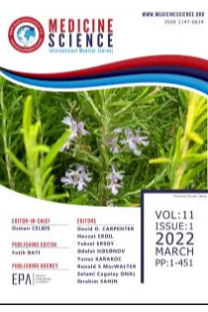Family functioning is related to health behaviors in patients with type 2 diabetes
___
1. World Health Organization. Global report on diabetes. http://www.who.int/ diabetes/global-report/en/ access date 06.01.20172. Alouki K, Delisle H, Bermudez-Tamayo C, Johri M. Lifestyle Interventions to Prevent Type 2 Diabetes: A Systematic Review of Economic Evaluation Studies. J Diabetes Res. 2016;2016:14.
3. Marin-Penalver JJ, Martin-Timon I, Sevillano-Collantes C, Del CanizoGomez FJ. Update on the treatment of type 2 diabetes mellitus. World J Diabetes. 2016;7(17):354-95.
4. Azmoude E, Tafazoli M, Parnan A. Assessment of Family Functioning and Its Relationship to Quality of Life in Diabetic and Non-Diabetic Women. J Caring Sci. 2016;5(3):231-9.
5. Ariza E, Camacho N, Londoño E, Niño C, Sequeda C, Solano C, et al. Factores asociados a control metabólico en pacientes diabéticos tipo 2 UBA Manga de Coomeva EPS en Cartagena (Colombia). Revista Científica Salud Uninorte. 2012;21:28-40.
6. Olson DH. Circumplex Model of Marital and Family Sytems. Journal of Family Therapy. 2000;22(2):144-67.
7. Carneiro AM. A família e o idoso: desafios da contemporaneidade. Avaliação Psicológica. 2012;11:317-9.
8. Jiang SS, Shen LP, Ruan HF, Li L, Gao LL, Wan LH. Family function and health behaviours of stroke survivors. International Journal of Nursing Sciences. 2014;1(3):272-6.
9. Lee JI, Im ML. Health Behaviour, Family Function and Depression of Middle-Aged Men. Indian J Sci Technol. 2015;8(S1):315-9.
10. Li K, Davison KK, Jurkowski JM. Mental health and family functioning as correlates of a sedentary lifestyle among low-income women with young children. Women & health. 2012;52(6):606-19.
11. Fleming MS. Associations between family functioning and adolescent health behaviors. Senior Honors Thesis. University of Rhode Island. Kingston, 2015.
12. López-Carmona JM, Ariza-Andraca CR, Rodríguez-Moctezuma JR, Munguía-Miranda C. Construcción y validación inicial de un instrumento para medir el estilo de vida en pacientes con diabetes mellitus tipo 2. Salud Publica Mex. 2003;45:259-67.
13. Figueroa-Suárez ME, Cruz-Toledo JE, Ortiz-Aguirre AR, Lagunes-Espinosa AL, Jiménez-Luna J, Rodríguez-Moctezuma JR. Estilo de vida y control metabólico en diabéticos del programa DiabetIMSS. Gac Med Mex. 2014;150(1):29-34.
14. Smilkstein G, Ashworth C, Montano D. Validity and reliability of the family APGAR as a test of family function. J Fam Pract. 1982;15(2):303-11.
15. Gómez Clavelina FJ, Ponce Rosas ER. Una nueva propuesta para la interpretación de Family APGAR (versión en español). Atención Familiar. 2010;17(4):102-6.
16. Suarez Cuba MA, Alcalá Espinoza M. Apgar Familiar: Una Herramienta Para Detectar Disfunción Familiar. Rev Méd La Paz. 2014;20:53-7.
17. Maville JA, Huerta CG. Health promotion in nursing: Cengage Learning; 2012.
18. Rosiek A, Kornatowski T, Frąckowiak-Maciejewska N, Rosiek-Kryszewska A, Wyżgowski P, Leksowski K. Health behaviors of patients diagnosed with type 2 diabetes mellitus and their influence on the patients’ satisfaction with life. Therapeutics and Clinical Risk Management. 2016 11/25;12:1783-92. PubMed PMID: PMC5135006.
19. Walker ONC, Mallory L-G, A. MJ, J. FA, Bruce RD. Family Relational Health, Psychological Resources, and Health Behaviors: A Dyadic Study of Military Couples. Military Medicine. 2016;181(2):152-60.
20. Balcazar P, Gurrola G, Bonilla M, Colin H, Esquivel E. Estilos de vida en personas adultas con diabetes mellitus 2. Revista Científica Electrónica De Psicología. Mexico. 2008.
21. Asif M. The prevention and control the type-2 diabetes by changing lifestyle and dietary pattern. Journal of Education and Health Promotion. 2014 02/21;3:1. PubMed PMID: PMC3977406.
22. Odume BB, Ofoegbu OS, Aniwada EC, Okechukwu EF. The influence of family characteristics on glycaemic control among adult patients with type 2 diabetes mellitus attending the general outpatient clinic, National Hospital, Abuja, Nigeria. S Afr Fam Pract. 2015;57(6):347-52.
23. Takenaka H, Sato J, Suzuki T, Ban N. Family issues and family functioning of Japanese outpatients with type 2 diabetes: a cross-sectional study. BioPsychoSocial medicine. 2013;7(1):1.
24. Miller TA, DiMatteo MR. Importance of family/social support and impact on adherence to diabetic therapy. Diabetes Metab Syndr Obes. 2013;6(6):421-6.
25. Rosland A-M, Heisler M, Choi H-J, Silveira MJ, Piette JD. Family influences on self-management among functionally independent adults with diabetes or heart failure: do family members hinder as much as they help? Chronic Illn. 2010;6(1):22-33.
- ISSN: 2147-0634
- Yayın Aralığı: 4
- Başlangıç: 2012
- Yayıncı: Effect Publishing Agency ( EPA )
Mohamed A ABU-SAİF, Mohamed E.A. ABDELRAHİM, Ahmed A.H ALİ, Hassan A. H ALİ
Assessment of postural conditions of children at early adolescence period
FADİME ÜSTÜNER TOP, DİLEK KONUK ŞENER
Assessment of sympathetic skin response to acne vulgaris
Ayşegül POLAT, Selma KORKMAZ, Hatice Köse ÖZLECE
Factors affecting psychosocial adjustments to illness of active tuberculosis patients
Semsinnur GOCEER, Osman GÜNAY, Rabiye Ozlem ULUTABANCA, Zehra Incedal SONKAYA
Effect of taping techniques on pain and grip strength in patients with lateral epicondylitis
Khaled Z FOUDA, Ibrahim M DEWİR
Little negligence leading to irreparable harm: Thinner burns
Kemal ARSLAN, Arif ATAY, TAMER SEKMENLİ, METİN GÜNDÜZ, Osman DOĞRU, İlhan ÇİFTÇİ
Beneficial effects of melatonin on acetylsalicylic acid induced liver damage in rats
M Ediz SARIHAN, Hakan PARLAKPINAR, Alaattin POLAT, Nigar VARDI, ONURAL ÖZHAN, HACI AHMET ACET
Idiopathic talipes equinovarus with preaxial polydactyly of the foot: a case report
Ali Tufan PEHLİVAN, Süleyman Semih DEDEOĞLU, Yunus İMREN
Serkan BODUR, Mine Kanat PEKTAŞ, Vuslat Lale BAKIR, Mehmet Ferdi KINCI, İbrahim ALANBAY, Özgür DÜNDAR
